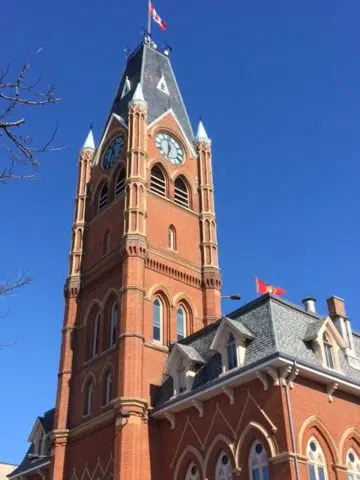Some members of Belleville council began their discussions Wednesday morning thinking the proposed $208 million ($150 million tax supported) operating budget would be discussed, amended, and approved by the end of the day.
But that was not to be as council will be back at the horseshoe Thursday afternoon after asking staff to come back with ideas on trimming the tax increase by a further one to two per cent.
Council itself had lowered the proposed increase from seven percent in urban Belleville and eight per cent in the rural part of the city down to five per cent urban and 5.5 per cent rural by 4 p.m. Wednesday despite all outside agencies, such as Hastings County, Emergency Services, Quinte Conservation, and public health submitting budgets with increases between five and 10 per cent.
Neighbouring municipalities have already passed budgets with tax increases between five and six per cent to date.
With the proposed seven per cent increase taxpayers would have paid around $300 more a year on each $250,000 of their property’s assessed value. So a homeowner with property valued at $500,000 would pay almost $600 a year more in taxes.
But at the end of the day Councillor Paul Carr said there was more work to do in tough times and council should at least ask staff to have a closer look at their respective budgets and come back Thursday with cost-cutting scenarios if at all possible. “We can’t pass these kinds of tax increases on to residents at this time. Many people are struggling.”
Carr said this budget was difficult because of inflation causing almost all costs to rise and the fact some of the decisions made by the last council, particularly on salaries, forced cost
increases out of this council’s control.
Carr was referring to a council decision to give substantial raises averaging about $20,000 to around 100 non-union staff which was effective July 01/22.
That decision has added $1.3 million to salary costs this year which represents a tax increase of one per cent in urban Belleville and almost two percent in Ward 2.
The last council’s decision to raise non-union staff salaries was made after an organizational review and a subsequent review of Belleville’s management salaries with other
similar communities, such as Cornwall and Peterborough among others.
That review showed that Belleville’s non-union salaries were in the 25th percentile, near the bottom of the salary range.
The city was and is struggling to attract and retain staff in a highly competitive market and top candidates have been difficult to hire.
After deliberation in closed session (personnel matters) council decided to move non-union salaries up to the 75th percentile to make the city more competitive.
The following are some of the spending cuts made by council Wednesday.
Quinte Waste Solutions was asking Belleville council for another $350,000. Council decided to have that paid out of its tax rate stabilization fund which has over $9 million in it so taxpayers won’t be affected this year.
An $87,000 increase from the Bay of Quinte Regional Marketing Board will be paid from the Municipal Accommodations Tax, not by taxpayers.
Council will contribute $350,000 less than the proposed $1 million into an asset management fund.
Instead of a $200,000 payment on a $1 million (over five years) commitment to University Hospital Kingston Foundation the city will make only a $50,000
contribution this year, steadily increasing its payments to hit $1 million over a six-year period.
That decision caused a lot of discussion with councillors Sean Kelly and Garnet Thompson very much in favour of keeping the contribution to $200,000 this year due
to the area’s aging population and the increasing demand for the complex care offered in Kingston.
However most on council said its commitment was still in place with Councillor Paul Carr saying all of the services now offered in Kingston would still be there for residents
as the city’s contributions were going to a capital fund for an expansion of University Hospital Kingston in the future.
Council saved a little over $61,000 by having the provincial gas tax pay the extra cost to expand the mobility bus service in Thurlow so the entire city will be serviced for a year.
Council will review the entire mobility bus service next year but councillors are committed to providing service to every corner of the municipality.
Council will contribute $300,000 instead of $500,000 in its Community Improvement Plan.
The Facade Improvement Plan in the Downtown District will see a contribution of $35,000 this year instead of $85,000. Councillor Kathryn Brown said contractors were just trying to catch up on the facade work already approved and most property owners who wanted to have work done have already applied and been approved.
Low income seniors and residents with disabilities will be pleased to hear that council is adding $100 a year to its tax rebate program. By 2026, the rebate for those who apply and are eligible will be $1,200.
Council will meet again starting at 1 p.m Thursday in council chambers with the aim of approving its operating budget for this year.
The meeting will be livestreamed.






